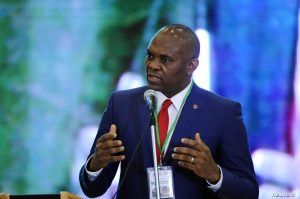
- Okonjo-Iweala reiterates calls for debt restructuring in Africa
The Chairman of the United Bank for Africa (UBA) and Founder of the Tony Elumelu Foundation (TEF), Mr. Tony Elumelu, yesterday urged governments and business leaders in Africa to prioritise youth empowerment and job creation.
He stated that by priotising youth empowerment and job creation, they will be able to improve standard of living in the continent and address the challenge of unemployment.
Also, the Director-General of the World Trade Organisation (WTO), Dr. Ngozi Okonjo-Iweala, reiterated her call for the restructuring of debts owed by African countries to enable them to provide economic stimulus for their economies and accelerate recovery from COVID-19 devastitations.
They both spoke at the UBA Africa Day Conversation 2021, which held via a virtual platform.
The forum also featured President Paul Kagame of Rwanda, the Director-General of the World Health Organisation (WHO), Dr. Tedros Ghebreyesus and the Managing Director of the International Finance Corporation (IFC), Mr. Makhtar Diop.
The conversation was moderated by Elumelu.
Elumelu, who is also the Chairman of Heirs Holdings, said the third UBA Africa Conversations was dedicated to discuss pressing issues facing the continent, its people and young population.
He said: “The priority for Africa is the empowerment of its youths and ensuring the creation of jobs and economic opportunities even during very difficult times.
“We have seen how our young ones despite COVID-19 leveraged their talents, expertise and technology to create wealth and support the communities they live in.
“We must, therefore, ensure that these young ones are made and not erased. We must create an enabling environment for our young entrepreneurs to succeed and empower them to create the jobs that would lift the continent to prosperity.”
In her presentation, Okonjo-Iweala said Africa’s economies required short-term policies that would enable them to get more fiscal stimulus.
She said: “So, if we want to recover, it is important to discuss about restructuring debt and giving African economies fiscal space to breathe so that they can invest not only on the health side but also on the economic side. This is how we are going to recover.
“The good news is that all our presidents like President Kagame have been pushing for this issuance of new Special Drawing Rights (SDR) at the International Monetary Fund, which agreed to provide $650 billion. Africa would get $34 billion but more may be allocated. We can use this to help implement more fiscal stimulus so that our economies can have the ability to recover.
“Moreover, some liquidity should go to the private sector. You know that in rich countries, private sector has gotten access to credit and liquidities that enabled their Small and Medium Enterprises (SMEs) to recover.”
She added: “Our youth is what we have; youth is gold to us and we can mobilise our youth productively to try to recover from this pandemic. I’m very proud the continent has done so far in coming together, especially our leaders who are trying to build a one Africa approach by building the vaccine acquisition group, by building a medical supply platform, bring together the COVID-19 envoys, which I was privileged to be part of and also by supporting CDC.
“If we are to recover sustainably, from this crisis, we have to correct the vaccine inequity that is so evident in the world today. The fact that we have vaccinated so little of our population is not acceptable. And the fact that we import 99 per cent of our vaccines and 90 per cent of our pharmaceuticals is not acceptable.
“The IMF just did an interesting study where they showed that if we spent $50 billion additional to vaccinate 40 per cent of the world’s population by 2021 and another up to 60 per cent in 2022, we would be able to reverse this vaccine inequity and the world can actually gain $9 trillion by 2025. I mean the numbers are staggering when you compare $50 billion to $9 trillion, we can make if we did this right.
“It is important for the world that we reverse this vaccine inequity and Africa benefits from it. We cannot recover sustainably without it.”
In his contribution, Ghebreyesus stated that Africa should, with the participation of its private sector, build capacity to produce its own vaccines rather than relying on foreign countries.
“The poor and the vulnerable are hit the hardest by COVID-19 and we cannot let down our guard. What that is happening in many parts of the world can also happen in our continent. Forty seven countries in the continent have started vaccinating.
“However, the volumes of the vaccines are nowhere near enough. So far Africa has administered somewhere over 25 million doses. This is very tragic. The WHO is working hard to bring about equitable distributions of vaccine doses.
“But it is clear that Africa cannot rely solely on import of vaccines from the rest of the world. We must build capacity not only for COVID-19 but for other vaccines and medicals. The corporation of the private sector will be essential in this endeavour,” the WHO boss added.
On his part, Kagame urged African leaders to develop the political will to make free movement of people within the continent a reality in order to facilitate African trade.
He also called for investment that would enable the continent to be part of the fourth industrial revolution that has been changing how people’s lives and work.
“The social and economic effects of the pandemic are very clear. We are counting on our continents resilience to see us through this crisis. “Fortunately, we are working together as a continent with our partners to build Africa’s vaccine manufacture capacity.
“The private sector has a big role to play in this. The next health crisis will not catch Africa unprepared again. When we talk about the emergence of the new Africa that means a continent that is confident in our ability to meet the needs of our people,” the Rwandan president added.
Diop, in his contribution, called for investment in infrastructure that would encourage intra-African trade and strengthened the continent’s SMEs.
 DailyrecordNg …Nigeria's hottest news blog
DailyrecordNg …Nigeria's hottest news blog







